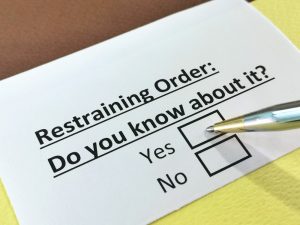Domestic Violence, Electronic Communication & Text-based Virtual Relationships
In New Jersey, the Prevention of Domestic Violence Act (PDVA), N.J.S.A. 2C:25-19, allows a person who is the “victim of domestic violence” to seek a restraining order for their protection from their abuser.

With an increase in the number of dating websites and apps, the current socio-political climate, and “shelter-in-place” orders resulting from the COVID-19 pandemic, people have become more dependant on technology, social media apps, and electronic communications to form, sustain, and virtually develop dating relationships.
Case C.C. v. J.A.H Impact on Final Restraining Orders in NJ
Earlier this year, in the precedential case of C.C. v. J.A.H., the New Jersey Appellate Division took a major step towards expanding and updating the law around final restraining orders (FRO). Erring on the side of caution, the Appellate Division modernized the statute to fit more plaintiffs’ situations and reflect everyday reality. Although the means of meeting people has changed, what constitutes domestic violence and harassment has not.
Texting Can Suggest a Relationship Without Any Physical Contact
In this particular case, C.C. v. J.A.H met at the gym where the plaintiff worked, and the defendant exercised and eventually began texting one another. Although the parties’ only contact was when they would see each other at the gym, they never kissed, held hands, dated, had sexual contact, or met the other’s friends. Still, they did exchange over 1300 very sexually suggestive and explicit text messages during the course of two months.
Harrassing, Vulgar, Insulting, and Inappropriate Messages
After a series of canceled dates by each party, the plaintiff texted that she saw no need for further communication other than “as a friend.” Upset by this news, the defendant sent the plaintiff a series of harassing, vulgar, insulting, and inappropriate messages and attempted to get her fired from her job.
After additional acts which the plaintiff found were harassing and threatening in nature, and upon learning the defendant was convicted of stalking and harassing another woman, the plaintiff sought an order of protection or restraining order. The defendant opposed the order and asserted that they did not have a “dating relationship,” as required for a protective order. Based on the facts of the case, the Family Part determined that there had been a dating relationship and that the defendant had harassed the plaintiff, thus supporting an order of protection under N.J.S.A. 2C:33-4, at which point a final restraining order (FRO) was entered against him.
Defining a Dating Relationship Via Electronic Communication
Although the defendant appealed the FRO, the Appellate Division affirmed the trial court’s decision and upheld the FRO, due to the in-person communication between the parties, and because “dating is a loose concept that changes from one generation to the next, (and) the volume and intensity of text message communications can establish a dating relationship, even in the absence of a traditional in-person date.”
TRO’s and FRO’s due to dating relationship via electronic communications
This means that you can seek a domestic violence protective order if your dating relationship was formed and continued via electronic communications, even if you and the other person never physically met. Temporary Restraining Orders (TRO) and Final Restraining Orders (FRO) are serious legal issues that can significantly affect your employment, educational, housing, and child custody matters.
If you believe you are the victim of domestic violence or harassment or have been arrested or charged with an offense related to domestic violence, or have been served with a restraining order, you must speak with an experienced attorney as soon as possible to protect your safety as well your rights.
CONTACT OUR TOTOWA NJ RESTRAINING ORDER LAWYERS FOR A FREE CONSULTATION
To speak with one of our highly experienced Passaic County restraining order attorneys, contact us online today or at 973-233-4396 or toll-free at 888-877-7985 for a free initial consultation.
